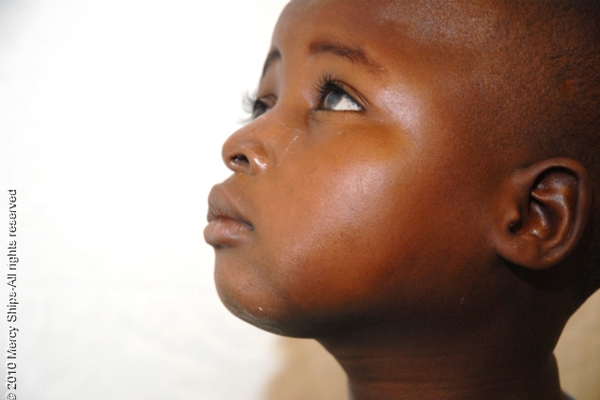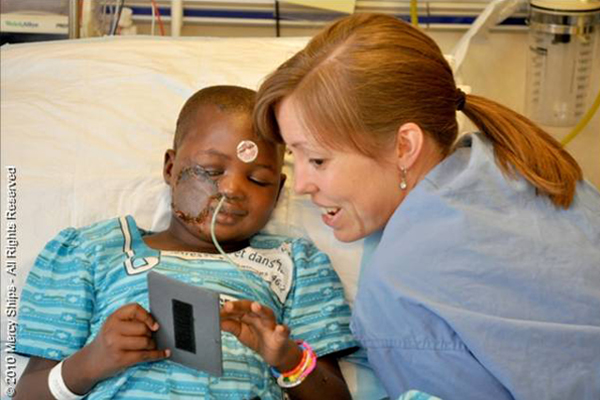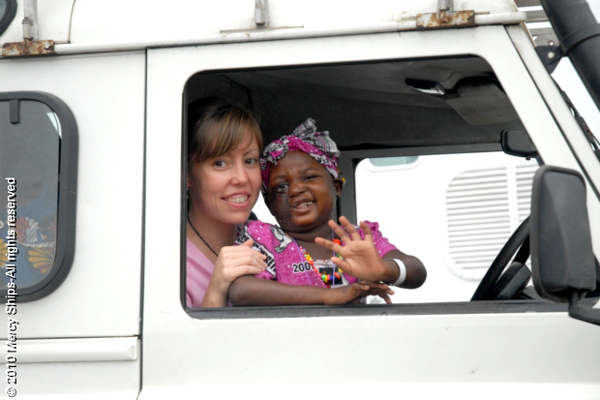I'm breaking my Sunday silence to jump on and hit post on this entry for two reasons. I have way too much to say about Togo to keep to just tomorrow, and I want to let you know that the 60 Minutes piece on Mercy Ships re-airs tonight. Even if you saw it the first time, it's worth tuning in again, because they've said there will be extra footage added. I have it on good authority that there might just be an adorable picture of my little family in our lifejackets somewhere in there. (Not that you've ever seen one before in my blog header or anything. Moving on.)
Here's the thing; I'm rambling because I have no idea where to start with Togo. It really is a good thing they're giving us two days to look back on this tiny little country, because in rummaging through my archives, I'm stunned by how many incredible stories I've been a part of in just two short field services there.
Togo was O'Brien and Anicette, Maurius and Francois and Esther, Tani and Toyi and Grace. It was miracles and heartbreak and questions about faith and God and suffering that were and always will be far too big for my small hands to hold.
The one that always comes back to me, though, the one who reminds me why I'm here every single time I think of her, is Aissa.
This is Aissa. She wasn't from Togo, actually; she came to us all the way from the streets of Cameroon where a missionary found her huddled in the dirt, covered by a piece of cloth, lying in the gutter and waiting to die. If you click on her picture, you'll see the other side of her face as it looked when she first came to us. (Warning: it's a graphic image.) And as bad as that is, it's not a photo of an active infection. This is what noma looks like once it has healed, once the black, dead tissue has rotted and fallen away, once the one-in-ten survivor has clawed her way through this disease of poverty and has come out the other side, irrevocably damaged because she didn't have access to a simple course of antibiotics.
![]()
Aissa was seven, and she had already endured enough hardship in her short life to break our hearts seventy times over. We saw it in her hunched shoulders, in her defiant anger and in her wild, darting eyes as we approached her bed. She wasn't an easy patient by any stretch of the imagination; her fits of rage were enough to bring the entire ward to a screeching halt, and keeping her from injuring her newly-reconstructed face when she threw a tantrum felt nearly impossible.
I'll never forget the day she tripped and fell while carrying a box full of memory pieces. She immediately curled into a ball on the floor, ready for the beating she was sure she would get for being so clumsy. Her wonder at being picked up and comforted instead was profound, and I think that's the day her heart really started to heal along with her face.
We talk a lot about the emotional transformation that so often happens in our patients after they've undergone the physical transformation of surgery, and I don't know that I've ever seen it as clearly as I did in Aissa. In the month that she spent on the wards with us, she blossomed from a frightened, furious little girl into one with a huge sense of humour, a girl who loved to help us with her wound care, a girl who would throw her arms around our necks and declare in her loudest voice, I lub you!
![]()
I'm not naive enough to think that reconstructing Aissa's face magically solved all her problems. Her family is still broken, her living situation still marked by extreme poverty. But what I do know beyond a shadow of a doubt is that we were faithful in the time we had with her. We loved her as hard and as well as we knew how, and I have to believe that it made a difference in her life.
We taught her one more sentence in English while she was with us, and I pray that she's still saying it now, just like she did when she waved goodbye as she left the ship to make the long journey back to Cameroon.
I'm beautiful. I lub you. I'm beautiful.
![]()
Here's the thing; I'm rambling because I have no idea where to start with Togo. It really is a good thing they're giving us two days to look back on this tiny little country, because in rummaging through my archives, I'm stunned by how many incredible stories I've been a part of in just two short field services there.
Togo was O'Brien and Anicette, Maurius and Francois and Esther, Tani and Toyi and Grace. It was miracles and heartbreak and questions about faith and God and suffering that were and always will be far too big for my small hands to hold.
The one that always comes back to me, though, the one who reminds me why I'm here every single time I think of her, is Aissa.
This is Aissa. She wasn't from Togo, actually; she came to us all the way from the streets of Cameroon where a missionary found her huddled in the dirt, covered by a piece of cloth, lying in the gutter and waiting to die. If you click on her picture, you'll see the other side of her face as it looked when she first came to us. (Warning: it's a graphic image.) And as bad as that is, it's not a photo of an active infection. This is what noma looks like once it has healed, once the black, dead tissue has rotted and fallen away, once the one-in-ten survivor has clawed her way through this disease of poverty and has come out the other side, irrevocably damaged because she didn't have access to a simple course of antibiotics.

Aissa was seven, and she had already endured enough hardship in her short life to break our hearts seventy times over. We saw it in her hunched shoulders, in her defiant anger and in her wild, darting eyes as we approached her bed. She wasn't an easy patient by any stretch of the imagination; her fits of rage were enough to bring the entire ward to a screeching halt, and keeping her from injuring her newly-reconstructed face when she threw a tantrum felt nearly impossible.
I'll never forget the day she tripped and fell while carrying a box full of memory pieces. She immediately curled into a ball on the floor, ready for the beating she was sure she would get for being so clumsy. Her wonder at being picked up and comforted instead was profound, and I think that's the day her heart really started to heal along with her face.
We talk a lot about the emotional transformation that so often happens in our patients after they've undergone the physical transformation of surgery, and I don't know that I've ever seen it as clearly as I did in Aissa. In the month that she spent on the wards with us, she blossomed from a frightened, furious little girl into one with a huge sense of humour, a girl who loved to help us with her wound care, a girl who would throw her arms around our necks and declare in her loudest voice, I lub you!

I'm not naive enough to think that reconstructing Aissa's face magically solved all her problems. Her family is still broken, her living situation still marked by extreme poverty. But what I do know beyond a shadow of a doubt is that we were faithful in the time we had with her. We loved her as hard and as well as we knew how, and I have to believe that it made a difference in her life.
We taught her one more sentence in English while she was with us, and I pray that she's still saying it now, just like she did when she waved goodbye as she left the ship to make the long journey back to Cameroon.
I'm beautiful. I lub you. I'm beautiful.
